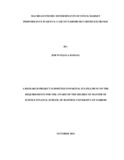| dc.description.abstract | The study sought to establish the determinants of stock market performance and used Nairobi Securities Exchange. The study was guided by an objective; to examine the effect of the selected macro-economic determinants of stock market performance in Kenya. The selected macro-economic variables included inflation rate, money supply and real GDP per capita. The study followed descriptive research design and used secondary data. The data spanned the period between 2000 and 2013. The data used for the analysis was the average annual figures and was obtained from; Nairobi Securities Exchange (NSE 20-Share), Central Bank of Kenya (CPI), Kenya National Bureau of Statistics (GDP per Capita) and International Monitory Fund website (Money Supply M3). The data was analysed using SPSS version 20. The study results established that NSE 20-Share Index (used to measure stock market performance) as well as CPI (used to measure inflation), money supply (used M3), and GDP per Capita deteriorated just before, during and immediately after the general elections. The regression analysis obtained Coefficient of determination (R), Correlation Coefficient (R-Square), P-Value and F-test statistics which were; 0.618, 0.382, 0.169 and 2.060 respectively. Since R was positive (0.618) the relationship between the Stock Market Performance and the macro-economic variables was positive. Since, R-Square was way below 0.75 as it was (0.382) the relationship between NSE performances as measured by NSE 20-Share Index is very weak. However, the study results established that the relationship between inflation as measured by CPI and Stock Market Performance is inverse as the corresponding coefficient in the model was negative. Also, since P-Value (0.382) was greater than 0.05, the established model describing the relationship between the study variables is statistically insignificant. This was supported by the F-test as the obtained test Statistics from the F-table at F10,3:0.05 was 8.79 which was greater than the F-test statistic 2.060, determined through the analysis. Furthermore, P-Values associated with each of the determinants variables were all greater than 0.05 depicting that the selected macro-economic variables were individually statistically insignificant in predicting the stock market performance. The study concludes that there is a weak positive relationship between the selected macro-economic variables (money supply, and GDP per capita) together and stock market performance. Further, the study concludes that the relationship between inflation and stock market performance is inverse but insignificant. The study concludes that the regulators including CBK should be proactive rather reactive as relates management of the macroeconomic variables. Also, since the study established that the macro-economic variables and stock market performance deteriorated just before, during and immediately after electioneering periods, succinct political and election structures should be established and regulations upheld to avert possible distortions of macro-economic factors and stock market performance and other economic agents. | en_US |

